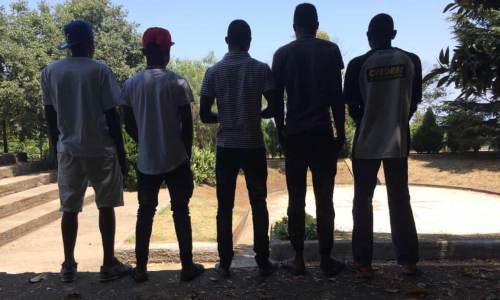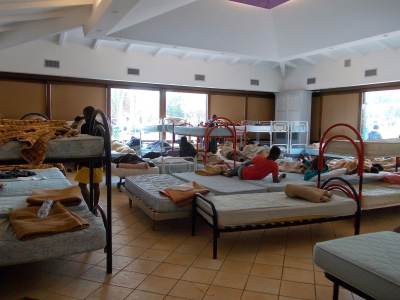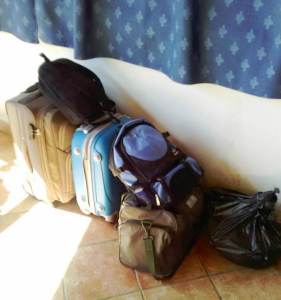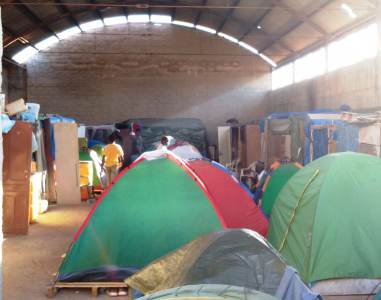The pain of invisible wounds
While forty years have passed since the ‚Basaglia’ law has been put into effect, the National Sanitary Service should ask itself how it has applied the protections required by law. The task of dealing with psychological diseases is a fundamental aspect of every society, by which one can effectively measure if the welfare system is capable of offering protection to those who are most vulnerable, Italians and foreigners alike.
In this respect, as for many others, migrants who reach Italy shed light on critical aspects of the sanitary system. In theory, it declares itself to be universal, in practice, however, it deepens discrimination and exclusion.
Numerous associations present and active in Palermo fight every day for facilitating bureaucratic procedures and enabling migrants to not only obtain valid residency documents, but foremost helping them to providing answers for urgent needs like a warm meal and a place to sleep or to wash oneself. At the migrant drop-in centres, when somebody with specific problems like mental illnesses presents him or herself or is intercepted, this person is promptly inserted in a special track in which the particular needs are met and cures provided. The persons which have been identified as “vulnerable” or as being afflicted by mental disabilities, however, meet higher difficulties not only in finding adequate care but also in finding a place for themselves in society.
On the one hand, spots in secondary reception structures for migrants identified as vulnerable are scarce. On the other hand, many of those who need specific cures or rehabilitation do not possess documents and thus are excluded a priori from the National Sanitary System taking them in charge. Adding to these difficulties, mental illnesses must be proven and documented. Yet, qualified personnel trained to identify persons who are victims of torture or inhuman and degrading treatment is lacking. Thus, failing to diagnose and document “invisible wounds” results in a further struggle when trying to formally prove the problems that arise as a consequence of those experiences.
For the personnel of the drop-in centres, communities and associations which advocate for solutions, frustration and stress rise. This stems from their lacking capability to tackle the pain of others and the lack of concrete and adequate responses provided by the welfare system. For the migrant, it is difficult not only to find a place where he or she can express himself or herself apart from the centres or institutions. Beyond that, this person needs to be listened to and supported in an active process of care or rehabilitation. The illness is often read as mere medical-psychiatric symptomatology and is objectified.
The most common answer to these psychological problems (maybe because it is quick to give) is the administration of pharmaceuticals without being sided with a psychological rehabilitation. For example, Hussein has been followed by various experts in Palermo. Yet, being homeless and having permit to stay, simple medicines have not helped to contain the pain which came regularly and impeded his sleep and work.
One other aspect must not be forgotten, although it is oftentimes undervalued or hushed. The work of Ernesto De Martino and Franco Basaglia claims that the “illnesses” must be seen in social terms. An illness can be regarded as a moment of resistance to the constituted social system, as a moment of indignation towards the social order for those who have been cut out from it. From this starting point the necessity arises to create therapeutically “neutral” places which do not reproduce hierarchies that have their influence on the mental illness, places where patients are truly being listened to. A migrant with a mental illness will then not only try to communicate the struggles tied to his past, but will also speak about his experiences of discrimination or rejection while in Italy.
The long wait for arriving at a destination, obtaining documents, finding a safe place to live, searching for work and finding the own loved ones are only a couple of the constant and long struggles that migrants have to face once in Italy.
Suleyman, for example, has lived in refugee and community centres but also on the street. His journey was neither linear nor rational, but the result of constant negotiations and efforts to be treated in acknowledgement of his guaranteed human rights. Like many migrants who have landed in Italy, Suleyman had been fighting not only his own inner ghosts, but also a slow and discriminating bureaucracy. After having followed recommendations from people he trusted and having fought for his rights, he found himself with a decision of refusal, thus in a situation repeated reject of the institutions. For this reason he menaced to react with the most extreme act: suicide.
He had invested all his energies to have his right to international protection recognized. Those paper documents would have enabled him to lead a life, to be recognized as being “worthy” of living in our society. All those energies seemed vain to him compared to suicide, which seemed the only viable solution. For him, this was the last chance to be recognized as a witness of the violence he experienced by not being officially acknowledged, a situation known to many migrants. In Arabic, the word for witness and the word for martyr are the same: shahīd, as if death was in itself a way of bearing witness. This is maybe the most accurate way to describe what Suleyman has done.
The wait is oftentimes exhausting. The sometimes extreme reactions of refugees have to be read under the light of a complex bureaucratical reception system, which pushes people to the limits, also the personal ones, testing the most intimate spheres of the “other” who is being rejected. Stories like those of Suleyman, even if they at times are less striking, are not rare. This behaviour is not only a gesture of despair, but also acts of resistance towards a living condition and forms of social exclusion and subordination which many migrants endure. The operating medical doctors, the personnel inside reception centres and also many volunteers from local associations notice after many meetings a common lack of sleep among migrants. They witness violent contortions due to stomach pain, but also moments of total passivity and moments of furious wrath. This states of mind and of physics cannot be explained solely from a medical perspective. The medical solution should not simply be a pharmaceutical or, worse, coercive sanitary treatment.
The therapeutical inefficiency of the medical system derives precisely from the fact that it concentrates on the symptoms of the illness, omitting the meaning of the disturbance fed by the experiences of the patient. If, in addition to this, welfare services to migrants are provided merely as emergency reactions due to the scarcity of time and resources to cure those afflicted with mental illnesses, the outcome worsens and can only further endanger the situation of the mentally ill. Mental disturbances and illnesses should be rethought as one of many forms in which pain, connected to social suffering, manifests itself. With the words of Arthur Kleinman, Veena Das and Margret Lock, “social suffering is understood as the consequences people have to endure being subject of political, economical and institutional power, and, reciprocally, as the way in which these forms of power themselves may influence the answers to social problems.”
On the other hand, if we come to think of it, an illness presents itself as an expression of the most individual, but also as the most social of events. Knowledge must be tested under social aspects. Every cure and decision from volunteers, medical staff and others dealing with refugees should take them into account.
Sofia Agosta
Borderline Sicilia
Translation from Italian by Alma Freialdenhoven





